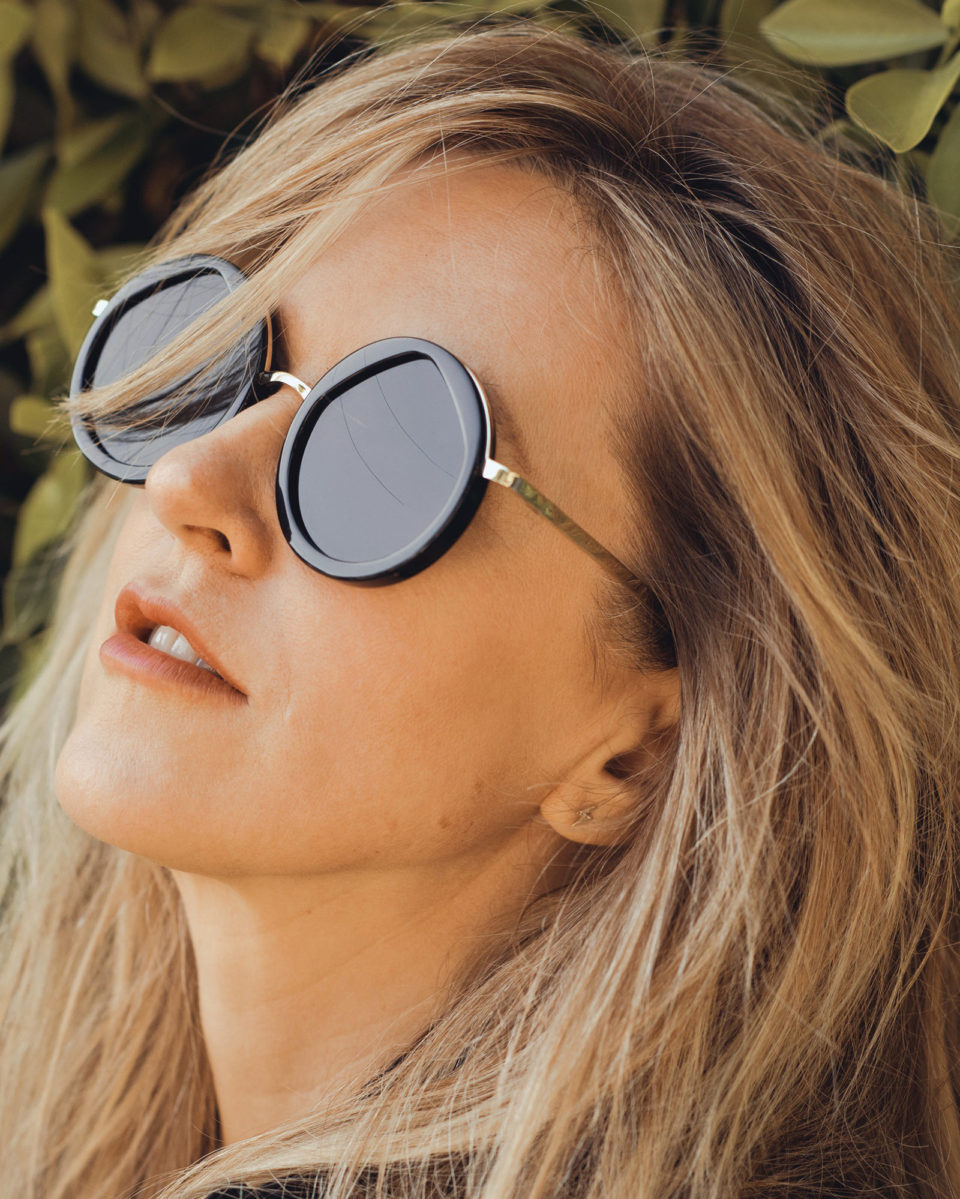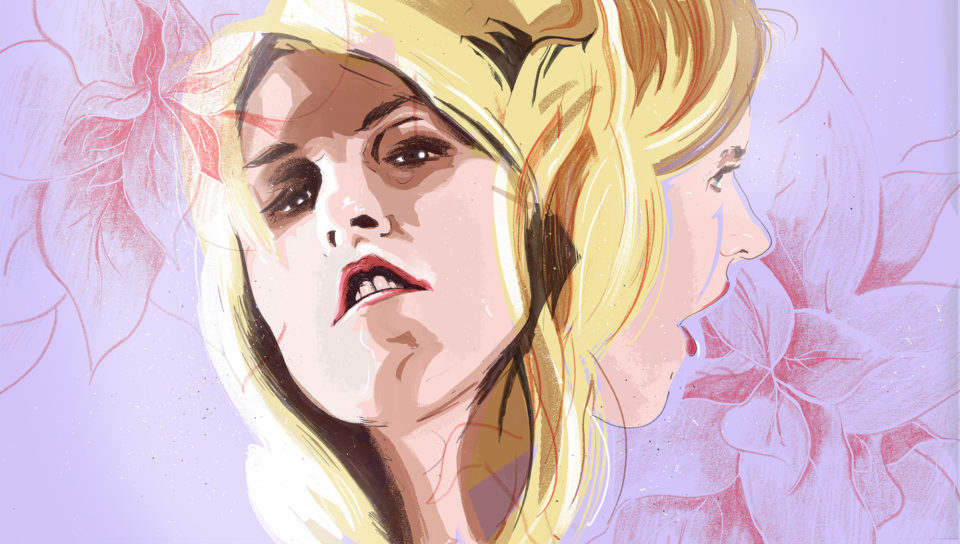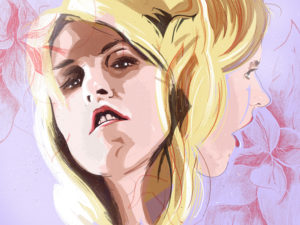By Jessica Bennett
The New York Times, May 3, 2018
In 1993, Liz Phair’s “Exile in Guyville” was the album of choice for a certain cohort of angsty young women. It was a song-by-song response to “Exile on Main St.,” the double LP by the Rolling Stones, which Ms. Phair considered the ultimate guy band. But it was also a reaction to Guyvilles everywhere: the male-dominated indie-rock scene she strived to be a part of; the boyfriend who said she could never make an album; and, for those of us listening, our own stand-ins.
Ms. Phair was defiant and sexual and unapologetic and vulnerable at once — a kind of girl-next-door casually swinging a sledgehammer at rock ’n’ roll as we knew it, singing about sex, love and power in a direct, unmediated way that few women before her had. Part of her punch came from the tension between her clean-cut Midwestern look and her explicit exploration of desire and death. “Guyville” catapulted her — 25, unemployed and smoking a lot of pot in the Wicker Park neighborhood of Chicago — to the cover of Rolling Stone, under the proclamation, “A Rock & Roll Star is Born.”
In the years since the album’s release, it has been both a triumph and an albatross for Ms. Phair. She was chided for never achieving its critical and commercial success again, for changing her sound, for being frustrated that she had been rebuked for changing her sound. Ms. Phair, now 51, released five more albums from 1994 to 2010 and is at work on a sixth. She is writing a memoir called “Horror Stories,” part of a two-book deal with Random House. It has been years since she’s toured.
But if ever there was a time to revisit Guyville, it is now — in a moment when its walls seem to be tumbling. Matador rereleases the album this month, along with songs from three cassettes Ms. Phair put out under the name “Girly-Sound” in 1991. Those young women who were touched by it 25 years ago are now marching, running for office, proclaiming #MeToo.
We spoke with Ms. Phair about the reissue, Lilith Fair and growing older in a youth-obsessed music industry from her home in Los Angeles. Here are edited excerpts from the conversation.
I tend to want to burn most things I wrote five years ago, let alone 25. What’s it like preparing to perform songs you recorded three decades ago?
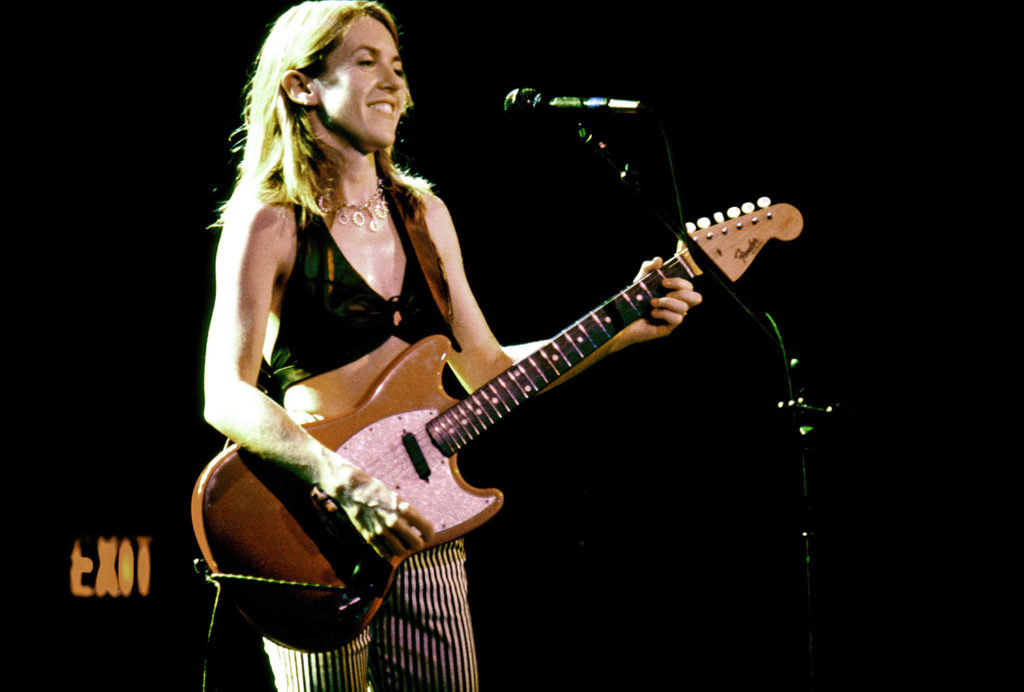
Mortifying, if you’re talking about the “Girly-Sound.” I can’t listen to the way I’m singing. I do this thing with my voice, it’s like [lets out a screeching sound]. It’s like a nails on a chalkboard. I just want to reach through the laptop and punch myself in the face. There’s a lot of stuff in “Girly-Sounds” that is just humiliatingly bad. What I’m going to do onstage is obviously not sing it exactly that way. [Laughs] But I think it’s an interesting story about how things evolve. The artistic process.
When “Exile in Guyville” came out you were a twentysomething who’d performed live just a few times. Suddenly, you were on the cover of magazines and topping critics’ lists. What was that like?
It’s weird, I realized I have a phobia of being pressed into crowds. Like a real, actual, have-to-get-out-of-the-car, have-to-leave-the-situation phobia. And I think that comes from that sudden success where, like, everyone was coming at me and I wasn’t prepared for it. It’s just weird because my whole adult life, then, was framed within the context of that first record.
And here you are answering questions about it.
Sometimes I feel like I work for Liz Phair. And I have years off but then, like, I work for her.
When “Guyville” first came out, you told The Times that you didn’t want to become “the next feminist spokesmodel.” Did you?
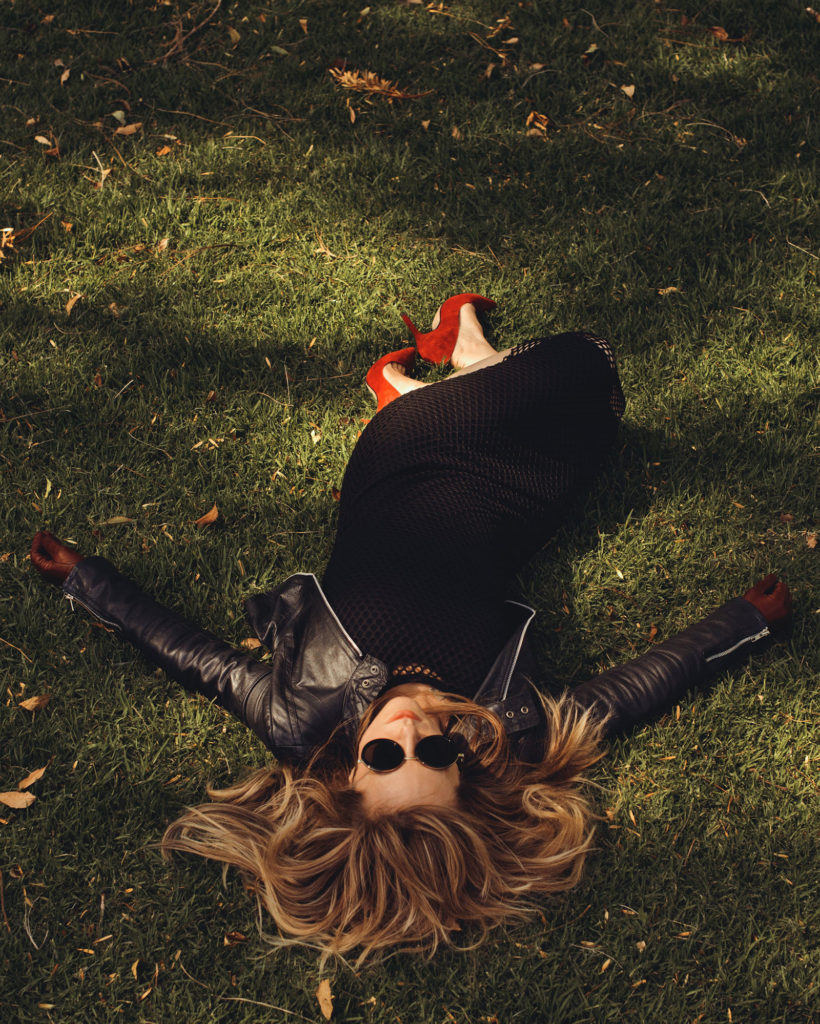
I’m sort of a feminist spokesmodel for, I guess, putting your voice out there, believing you have something to say and maybe sex-positivity or something. I have been placed there because there was a sense that I was the girl next door who just picked up a guitar and went onstage and said what everyone was thinking. And it felt empowering to me and it felt empowering to the people that heard it, especially the women. So, the accidental feminist spokesperson. I do get uncomfortable with the label because I feel like there are people that could be far more eloquent about it, historically so.
You’ve said that album was fueled by defiance: this sense of wanting to prove wrong the people who told you that you couldn’t do it. Do you still think about it that way?
It was clearly in a tussle with the sort of male-dominated music scene. Using the Rolling Stones’ “Exile on Main St.” was sort of like using their avatar. I thought that was the quintessential guy rock band, you know? So I substituted in my head the characters from “Exile” with the characters I knew from around the neighborhood. Sort of talking to them vis-à-vis the conversation I was having with the Rolling Stones.
What was it like to be a young woman in the music industry then?
I didn’t run into that many women doing what I did. And when we did run into each other, there was kind of a weird sense — and maybe this was me, because I was young and insecure — but it felt like people would pit the girls against each other. It would be like, “Do you like Courtney or do you like PJ?” And the sale forces, the market forces, were gross. It was like, “Look hotter! Get more naked!” Like as if it was a Jell-O wrestling contest. Like, “Let’s put this female icon up against that female icon. Which do you like better?” It was a tokenism, and it was gross.
Did that change?
It wasn’t until Lilith Fair came along that I really felt like that was resolved. Like, Lilith Fair for me, just eradicated all that. I was treated differently after it. You needed a goddamned female festival to stop that provocation.
In an age where we have Beyoncé headlining Coachella, do you think those all-female spaces are still needed?
There are just so many more women in music today. I feel like every day on Twitter I find some new female band I’m interested in, and I can have my entire music diet be female songwriters and musicians, and I wouldn’t come to the end of it, and I wouldn’t be bored, and I wouldn’t feel like I was listening to all one genre. It’s so wide and diverse, just in terms of sheer numbers. But the [younger generation of] women, they don’t feel that way. You know, if you ask them, they feel the way I felt, like they’re isolated and pitted against each other and told to be hotter. It’s just interesting. It’s very different from my eyes but to them they feel like they’re going through Guyville.
What about being a woman in the music industry who is no longer in her 20s? Do you still feel the pressure to look a certain way?
That was hard in my late 30s and my early 40s because I was still sort of in that category. But the good and the bad of my age now is like, they’re not even requiring that of you any more. You can do it, and I do because it’s fun. But they don’t really expect it. You’re kind of like a “legacy act.” Which is just as nonsensical as any label they slap on you, but I’ll take whatever breaks I can get.
In almost every interview I do now it feels like we reach the point where I have to ask about #MeToo. There’s almost no instance where the person, if female, hasn’t faced some type of harassment or mistreatment. What has been your experience?
Well, of course not. Everybody went through it. Every single woman went through it. It’s the way our entire society is structured. Everything is structured around men. We still don’t pay the first lady! That blows my mind.
What do you make of this moment?
I’ll tell you where I’m at with it. I’m at the point where I don’t feel like I have to do anything differently. I think it’s all on men now. Like, they’re just going to have to deal with it. They’re going to have to do their therapy, do their thinking, do whatever they need to do — cry together, whatever the [expletive] it takes. I just don’t feel that I need to help. And I’m not in any way antagonistic toward men, that’s the weird part. This is old, old news for me. And it just is a matter of, this isn’t ours to explain to you anymore. It’s common sense. Like, let them deal with it. They’re the ones with the problem.
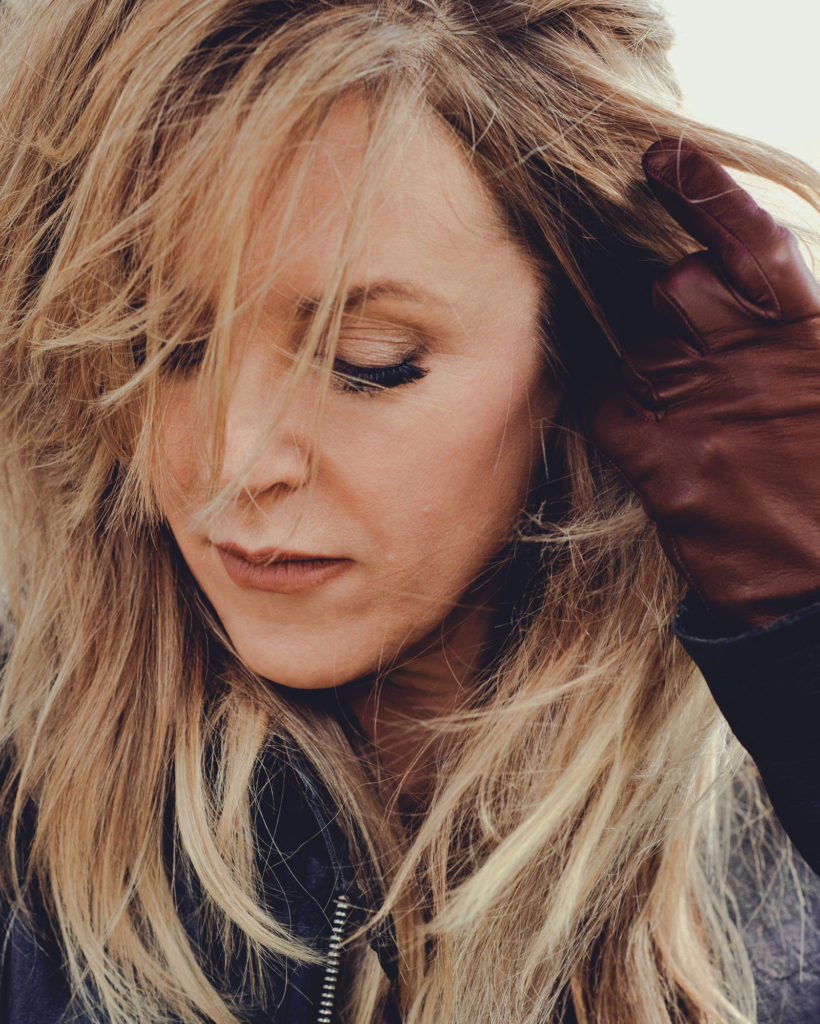
I was reading an interview you did with Elizabeth Wurtzel where she said she basically no longer consumes art created by men. Where do you stand on that?
I’m still interested in knowing what art is being made by men. I think there’s just a natural sense that there is more to enjoy. It’s like anything where we suddenly have a wider choice of options. Like, now we have so many more women to listen to and find out about and, yay. Like, more art! Great! What we really need to do is make everybody aware of what we’ve done to the various parts of society that haven’t had a seat at the table — and offer them a chair.
Many people probably still think of you primarily as a musician, but you’re working on a book. Is writing in that format different for you?
It was. Now it feels as natural to me as writing a song, but that took 10 years of writing quietly.
Have you been working on this book for 10 years?
No, I’ve been writing other things, but when I first decided that I wanted to write I had no clue how. Had I known it would take me 10 years to be able to write the way I want to write — and to feel like I have mastery over my writing — I never would have started. [Laughs] Too late, no turning back now.
Have you always had that determination?
Yeah. My first words were, “by self.” So there was always a determined little person in there. Like, always. Never not.
What do you hope people will take away from “Guyville” this time around?
I want more women to log on to history. I’ve always wanted that. As [expletive] as this moment is in American culture, there’s something that I find very exciting and positive about it. I want, 500 years from now, people to be able to look back and learn what women were thinking, what they were feeling, what they wanted, what their lives were like. I want them to be historically there, present, remembered. And I want to be a part of that.
When was the last time you toured? Are you nervous?
Oh my God, a long time ago. I’m getting ready for a photo shoot; I haven’t figured out how to be in photo shoots again yet. I don’t know what the hell to look like. I don’t know who the hell I am. I know who I am on the inside, but I don’t know how to put that on the outside.
Jessica Bennett is gender editor at The Times and the author of “Feminist Fight Club.”
Featured image by Ryan Pfluger for The New York Times
